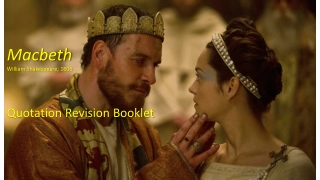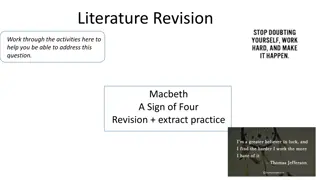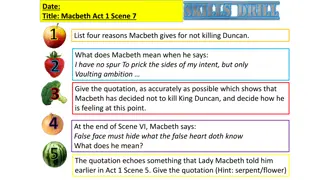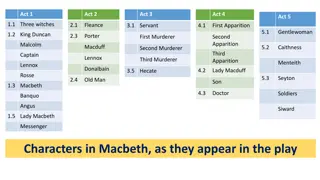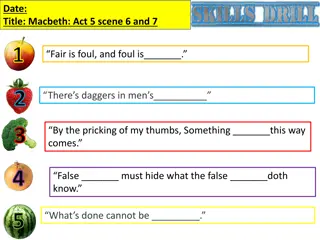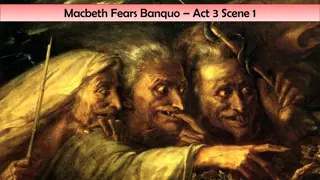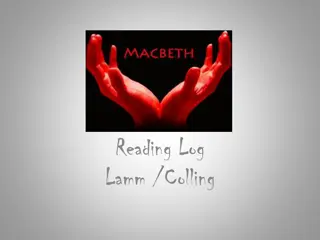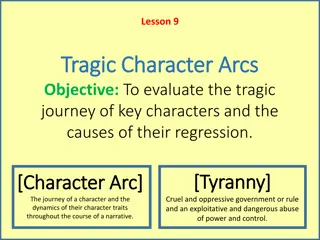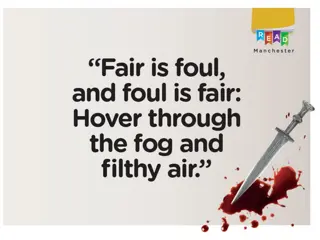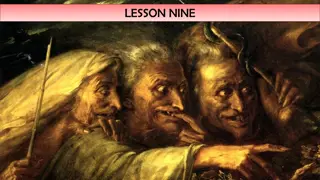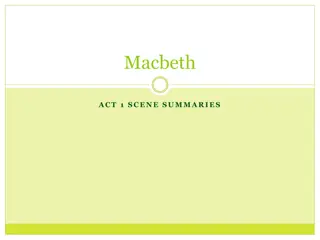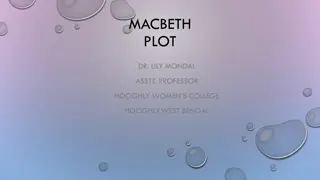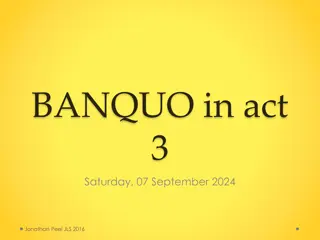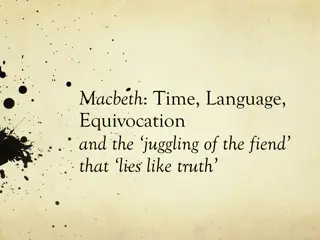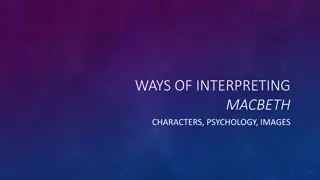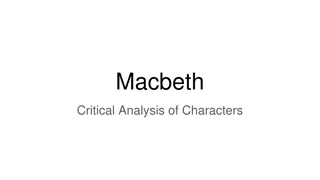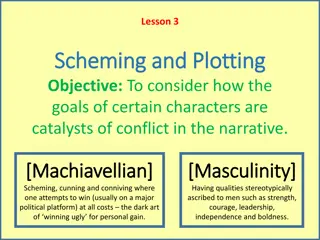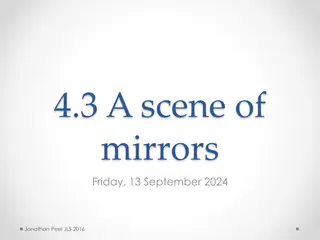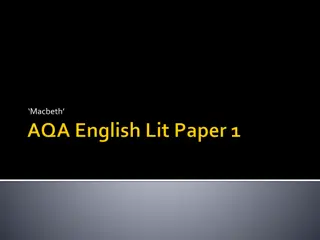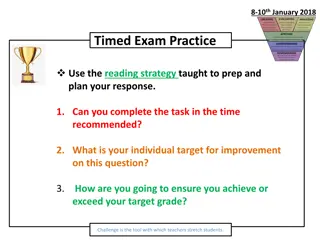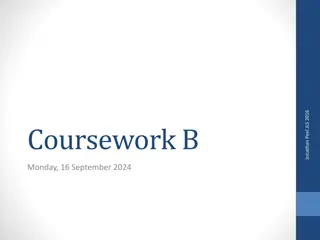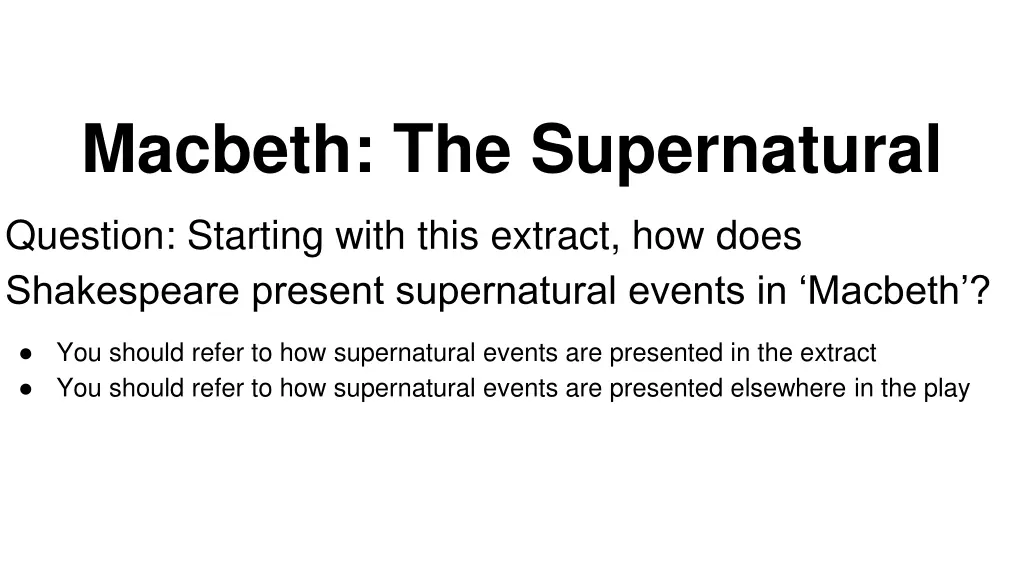
Unveiling Supernatural Elements in Shakespeare's Macbeth
Explore the portrayal of supernatural events in Shakespeare's Macbeth, focusing on key scenes such as Macbeth and Banquo meeting the Witches, Lady Macbeth's soliloquy, the "Is this a dagger" scene, and Banquo's ghostly appearance. Delve into how Shakespeare weaves supernatural elements throughout the play to drive the narrative and characters' actions.
Download Presentation

Please find below an Image/Link to download the presentation.
The content on the website is provided AS IS for your information and personal use only. It may not be sold, licensed, or shared on other websites without obtaining consent from the author. If you encounter any issues during the download, it is possible that the publisher has removed the file from their server.
You are allowed to download the files provided on this website for personal or commercial use, subject to the condition that they are used lawfully. All files are the property of their respective owners.
The content on the website is provided AS IS for your information and personal use only. It may not be sold, licensed, or shared on other websites without obtaining consent from the author.
E N D
Presentation Transcript
Macbeth: The Supernatural Question: Starting with this extract, how does Shakespeare present supernatural events in Macbeth ? You should refer to how supernatural events are presented in the extract You should refer to how supernatural events are presented elsewhere in the play
Planning You have read up to Act 4.2 so have several areas to choose from for the supernatural. The extract is from the beginning of the play A1S3 (Macbeth and Banquo meeting the Witches) so you choose two other later areas to explore in relation to the supernatural. Some ideas that work: Lady Macbeth s soliloquy where she calls on spirits to help her Ross and the Old Man discussing unnatural affairs Is this a dagger scene where Macbeth sees hallucinations and is driven to commit regicide Banquo s ghost appearing in the hall when Macbeth has people over to dinner Hecate s speech
My Plan - Where in text, what in text, context link Essay Structure: Extract focused paragraph 1.3 discussing the prophecies and including the superstitions of Witches/King James 1st being heavily suspicious of them/warning 2.1 Is this a dagger scene where Macbeth sees hallucinations and is driven to commit regicide - madness & guilt juxtaposed with earlier brave and valiant presentation of Macbeth - treason / regicide 3.4 The Ghost of Banquo appears when Macbeth has people over to dinner - the great chain of being/divine rights of Kings
My Quotations/events from elsewhere & the methods Essay Structure: Use extract to annotate best quotations to use 2.1 Is this a dagger I see before me? Rhetorical question / hypophora as he answers himself. False creation noun phrase blood on the dudgeon connotations/visual imagery. A bell tolls stage directions and auditory imagery - symbolism. summons thee to heaven or hell. Biblical connotations imperative verb 3.4 The Ghost of Banquo enters and sits in Macbeth s place - stage directions visual imagery - Which of you have done this? question and angry tone - never shake thy gory locks at me visual imagery, connotations, - which might appal the devil biblical connotations - thy bones are marrowless thy blood is cold. repetition, visual imagery metaphor.
This would be a very detailed plan Introduction instructions I want to show you that mind mapping and writing the quotations/ideas from another point in the play x 2 can be useful as it shapes your essay. Now, you are ready to write an introductory paragraph. In the introduction you need a minimum of two sentences: Author name, text type, text name and overall answer to the question, plus a sentence that introduces your three ideas from the extract and two other places in the text. If you want to demonstrate higher level understanding you can make contextual or intention links in another sentence.
Basic Introduction Question: Starting with this extract, how does Shakespeare present supernatural events in Macbeth ? Shakespeare, in his Jacobethan play, Macbeth presents supernatural events as a warning to society. First, the Witches introduce Macbeth to prophecies; then, Macbeth hallucinates out of guilt; finally, Macbeth sees the Ghost of Banquo following his murder.
More detailed Introduction Question: Starting with this extract, how does Shakespeare present supernatural events in Macbeth ? Shakespeare, in his Jacobethan tragic play, Macbeth presents supernatural events as a warning to society due to King James 1st being paranoid, nervous and fearful of interventions in his Kingship by Witches. First, the Witches introduce the main protagonist or arguably antagonist, Macbeth and Banquo, to three fateful prophecies; then, Macbeth hallucinates out of guilt before deciding to commit regicide against the worthy King Duncan; finally, Macbeth sees his former friend Banquo following his murder, in ghost form, foreshadowing Macbeth s further fall from grace.
Introductions Question: Starting with this extract, how does Shakespeare present supernatural events in Macbeth ? Either introduction works, but the more detailed one shows higher level understanding by linking to context (underlined) and using methods that Shakespeare has used in order to emphasise Shakespeare s reasons.
Using the extract As you can see the extract has been annotated with key ideas and methods that might be useful to discuss in relation to the extract.
Using the extract Due to the extract being the first part of the play, I would recommend placing this as the first paragraph in your essay.
Writing your main paragraphs Explore multiple quotations to build your argument around the question. Use: What - answer the question How - method and evidence Why - Meaning, effect, context, intentions, focus on keywords Sentence structure to support you: Shakespeare explore the focus on the supernatural through the The (method) in (evidence) suggests/implies/demonstrates because The reader might feel Shakespeare could be focusing on this to However, in context this links to (you can repeat method/evidence/meaning/effect)
Basic extract paragraph 1 Shakespeare explores the focus on the supernatural through the Witches speaking to Banquo and Macbeth and giving them prophecies. The repetition of the pathetic fallacy in so foul and fair a day suggests that something bad and evil is on the way because weather that is so terrible is not natural and it repeats the earlier words of the witches in Act 1.1. As well as this, when they meet Macbeth they prophesied Thane of Cawdor! with the exclamatory sentence appearing factual but it has not yet happened, therefore suggesting that they can predict the future. The reader might feel the Witches are strange and unnatural beings who are entertaining but also frightening. Shakespeare could be focusing on this to reinforce that Witches were being violently hunted as they were extremely suspicious creatures who controlled aspects of life that should not be controlled, such as the weather and predicting the future. However, in context this links to King James the 1st and his extreme paranoia and suspicion of Witches, Witchcraft and the idea that they might meddle with his Kingship.
Developed extract paragraph 1 During Act 1 Scene 3, Shakespeare shows Macbeth and Banquo in appalling weather returning home when they meet Witches who look not like th inhabitants o the Earth implying they are strange and unnatural creatures who don t belong to the land they are stood upon. The dialogue from Banquo uses a questioning tone and he reflects on their So withered and so wild appearances which indicate that they are unattractive, strange and frightening in their presentation making the supernatural appear horrible and intimidating and something that the audience should be horrified by. However, Macbeth introduced with pathetic fallacy and a link to the earlier reflections by the Witches in Act 1 Scene 1 So foul and fair a day indicating that the weather is terrible, unappealing and so awful that Macbeth and Banquo would not expect to see anyone else on their journey, making the supernatural appearance of the Witches even more surprising and intimidating and making Banquo s natural suspicion seem realistic. Although the Witches are clearly otherworldly Macbeth engages them in conversation. They reply with All hail showing their collective nature and how they work together in a three. Then, they indicate with the exclamatory sentence that Macbeth will be Thane of Cawdor a prophecy which has yet to happen and which is stated as a fact and although it is not yet true, it piques both Banquo and Macbeth s interest. They reinforce this with the imperative verb that shalt be King hereafter! indicating that Macbeth s future is already settled and he is to be the ruler of the land. This could seem problematic to the audience as King Duncan has shown himself to be a good King. Banquo is worried by Macbeth s reaction as he uses the verb rapt withal to show that his good friend Macbeth seems taken in and interested in the way that the Witches have talked to him evoking curiosity in Banquo as to what will happen to him. The presentation of the supernatural is also linked to the idea that witches can predict the future when Banquo says If you can look into the seeds of time which uses modality to suggest that he is unsure about whether or not the rumours and superstitions around Witches at the time are true or not. Clearly, Shakespeare is highlighting the prevailing concerns about Witches in the time of the Jacobethan King, who was paranoid and doubtful about his rightful place on the throne and thought that he was going to be usurped. This suspicion by King James meant that he write a book called daemonologie, which was essentially a manifesto against witches and witchcraft relating the supernatural to an unnatural evil that needed to be eradicated from the earth. Therefore, Shakespeare s clever Scottish play, Macbeth flatters King James as it warns against believing what witches tell you and ensuring that you are not taken in and deceived by the lies and prophecies that they foretell, unlike Macbeth who was driven to treason as a result of their supernatural manipulations.
Basic paragraph 2: overly long quotation - not enough analysis/effect Another way Shakespeare explores the supernatural is through Macbeth s soliloquy when he sees a dagger. The question in Is this a dagger which I see before me? The handle towards my hand. Come let me clutch thee. suggests that Macbeth is seeing a dagger which is not there and he wants to hold onto it. Shakespeare could be focusing on this to show Macbeth s madness.
Paragraph 2: Detailed but with context/intentions integrated As well as exploring the supernatural through the presentation of the witches, Shakespeare warns the audience of the perils of committing regicide by showing Macbeth s problematic state of mind before he kills King Duncan. He is riddled with guilt and indecision when he use the hypophora in his soliloquy in Act 2 Scene 4 Is this a dagger I see before me? indicating that he knows that his brain is manifesting a vision of a dagger to reflect his guilt about what he is about to do. King Duncan is undeserving of his fate and Macbeth seems to know this but is encouraged by the visual imagery of blood on the dudgeon implying that the dagger has been pushed so far into the King that it has covered itself in blood, a sign to Macbeth that what he is about to do will be successful. However, he knows it isn t truly a real dagger as he calls it a false creation showing that he knows it isn t there and he is hallucinating supernatural visions to encourage him to continue in his cruel and treasonous behaviour. Macbeth is aware that in the Great chain of being that King Duncan doesn t actually deserve to be killed but he will do it anyway as he has been convinced by the witches interventions in his life and his wife, Lady Macbeth s manipulation that this is what he has to do, in order to fulfill the earlier supernatural prophecies. Connotations of blood are death and gore and deceit in this case, due to the way that Macbeth will get blood on his hands a symbolic reflection through the play, showing that Macbeth is not being moral and is being fully influenced by the supernatural. When he listens and hears a real bell tolls in the stage directions this auditory imagery creates the impression that Macbeth is brought out of his supernatural vision and reverie by the real life intervention and is reminded of his purpose. He then states that the bell summons thee to heaven or hell. using biblical connotations and the imperative verb to reinforce his determination to kill King Duncan, a morally questionable act, that is linked to the interventions of the supernatural.
Basic paragraph 3: using moments to analyse without quotations Another way Shakespeare presents the supernatural is through ghosts and hauntings. Banquo appears and the stage directions tell us that he sits directly in the chair that Macbeth should be sitting in. This makes Macbeth angry and anxious as he believes he is being deliberately tricked and manipulated by the assembled guests. This leads to his ranting and incoherent behaviour making him seem mad and unstable. At this point, the dramatic irony is clear as we know that he can see a ghost but the guests at the banquet are unaware that this is causing his madness. Evidently, Shakespeare may be using ghostly manifestations as a warning to Macbeth to change his course of action as he has murdered his friend Banquo and is now being haunted by this fact (something that did not happen when he killed King Duncan.) Perhaps, the closeness of their relationship means that Banquo needs to come back and haunt Macbeth as his actions are increasingly horrific and his control and grasp on reality seems to be slipping particularly as he continues to seek supernatural interventions after his murderous behaviour. Contextually, Scotland and England have a particularly bloody rivalry and perhaps the death of Banquo prompts Macduff to seek Malcolm, who is being supported by the English monarch, in order to put an end to Macbeth s bloody, treasonous reign.
Paragraph 3: linking the paragraphs and using elsewhere in the play to support The interventions of the supernatural are also seen in Act 3 Scene 4 when Banquo s ghost sits in Macbeth s place during a state dinner. The stage directions The Ghost of Banquo enters and sits in Macbeth s place show that Shakespeare is determined to play with Macbeth s state of mind as he has previously ordered the death of Banquo, his once loyal friend. Macbeth seeing the vision of Banquo is surprising to him and makes him feel anxious and nervous, so much so that he uses a questioning and angry tone at his guests as he looks at nothing Which of you have done this? reinforcing his lack of control and implying that he can see something that the others can t. His state of mind is clearly in question due to the supernatural vision that he is able to see. When he uses visual imagery never shake thy gory locks at me there is no doubt in his guests minds that Macbeth is out of control and slightly mad. The use of gory locks has connotations relating to Banquo being beheaded and his hair being covered in blood as a result of Macbeth s actions showing that Macbeth is cold, callous and cruel but that his initial belief in the witches prophecies have led him to no longer be brave or valiant . Prior to his meeting with the witches he was a good person, loyal to the King and worthy of respect, however as soon as the witches spoke to him his vaulting ambition took over and made him immoral and willing to do anything to succeed and be King. Macbeth recognises this when he says which might appal the devil with the biblical connotations showing that he is aware that the vision he is seeing is unnatural and frightening. The audience might feel thrilled by the unravelling of Macbeth s sanity as he is wholly unsavoury as a character and King James the 1st might be pleased that the treasonous behaviour is being paid for by Macbeth in his loss of sanity. Finally, when Macbeth says thy bones are marrowless thy blood is cold. the repetition and metaphor reinforces that Macbeth feels justified in the behaviour that he has participated in. Macbeth is almost gloating about the death of his friend, but probably out of fear as the supernatural vision has shaken and threatened him in front of people that he believes are important. The supernatural is presented as a threat to Macbeth s kingship and his sanity reinforcing that he needed to be more careful and cautious but also intimating that
Conclusion: What you are trying to do In your conclusion you are trying to summarise what you have already said, including your three ideas and linking briefly to your ideas across the essay. You might want to discuss context or intentions.
Conclusion Shakespeare presented the supernatural through the witches unnatural appearance and knowledge, Macbeth s madness when he hallucinates the bloody dagger that foreshadows the demise of King Duncan and his friend Banquo appearing to him in ghostly form after Macbeth had him murdered. Shakespeare could have been highlighting how suspicious King James the 1st was in relation to the supernatural and emphasising through Macbeth s behaviour how unacceptable committing regicide was and how that behaviour would be punished.

